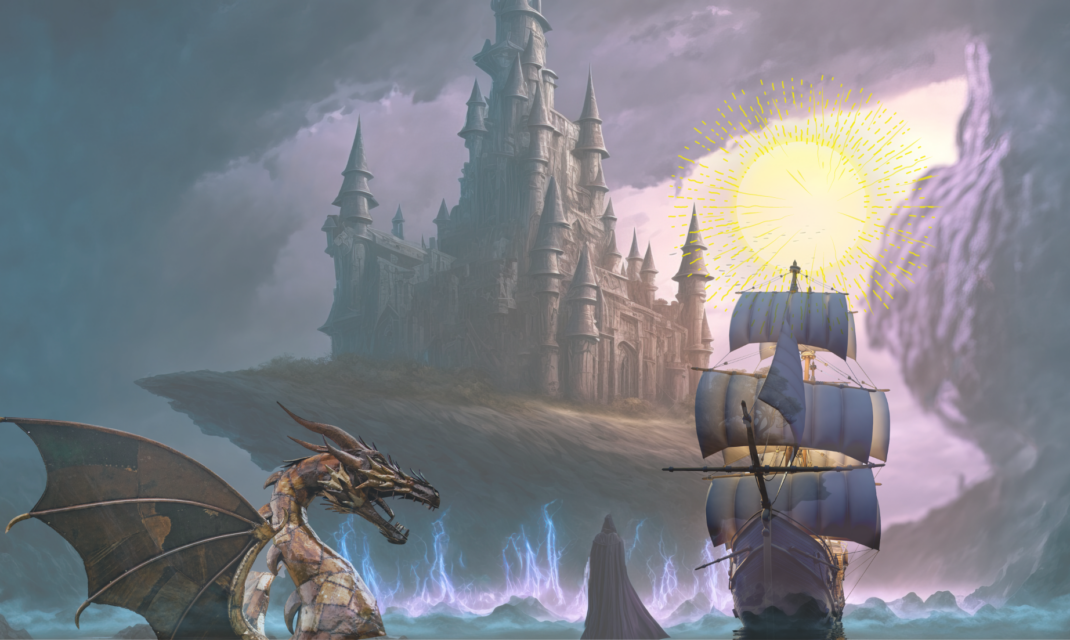Throughout Lent, guest blogger Dr. Junius Johnson will be reflecting on the season through the lens of C.S. Lewis’s great series, The Chronicles of Narnia. We invite you to join him in revisiting this world of childhood imagination even while you prepare your hearts to rejoice again in the salvation Christ worked at the cross.
Since ancient times, Christians have referred to the church as a ship: specifically, as Noah’s ark, in which God’s faithful are being saved from the destruction of the world. This is why the bulk of a church is called a nave, from Latin navis, meaning “ship.” And so it is fitting that the Narnian book devoted specifically to considering the progress of the Christian life should be about a sea voyage. Read this way, the Dawn Treader may be understood as an image of the Church, and its crew are faithful Christians.
Travelling with this community throughout its voyages is the grace of God, signified in one very clear instance by Lucy’s cordial, which Caspian has brought along as the Narnian treasure most likely to be necessary for such a journey. It is made from the fire-berries that grow on the sun. Much later in the book, we will actually see one of those berries, given to the star Ramandu to take away his age in a morning liturgy that puts us in mind of the Eucharist. And even as this berry makes Ramandu younger, we must be mindful of Ignatius of Antioch calling the Eucharistic host the “medicine of our immortality.” Lucy’s cordial is a portable Eucharist that the Dawn Treader carries with it on its journey.
The voyage itself represents the Christian life. And we see that it is beset with dangers and trials: tests of wisdom, such as when their majesties foolishly wander the Lone Islands without proper precautions; vigilance, as when the sea serpent nearly catches the crew unawares after days of tedium so intense that they nearly made Eustace into his old self again; greed, such as at Deathwater, when Caspian, who rules the happiest kingdom in the world, also wishes, beyond all reason, to be the richest king in all the world (who is, by the way, almost without doubt, the Tisroc of Calormen); allegiance, as with Lucy’s encounters with the magician’s book, which challenges her again and again with idolatry, raising the question whether she will trust in Aslan or in her own machinations to find her joy; courage, the challenge of the Dark Island, where the crew must cling to Aslan in the midst of spiritual assaults; and duty, a test Caspian nearly fails in his desire for novelty and the sight of the hidden things at the end of the world.
The voyage itself represents the Christian life. And we see that it is beset with dangers and trials. . .
The Christian life is not merely a matter of tests and dangers, however: it is also a matter of wonder. We see this most clearly in the Last Sea, where there are strange sights and a water that is a sort of drinkable light, a glory that can be consumed by men and that also makes men capable of greater glory.
Now what it is important to recognize is that what Lewis must represent successively, because of the needs of narrative, is actually simultaneous: we do not leave the sea serpent behind; rather, he remains ever ready to spring on us if we become negligent. There will be many Deathwaters as we journey through life, temptations to sell out our friends and our own soul for a wealth or power that will cost us the very way in which we are in the image of the Lion (our kingship) and turn us into such a tyrannical petty ruler as the Calormenes have. And the Island of Darkness does not disappear when we have escaped it, except perhaps for a time; but the false dreams that we would build our lives on but that in fact will unmake us are always lying in wait, ready to take us captive with the foolish promise of penultimate pleasure.
And here is where I think we can also take heart, because this also means that every sea is the Last Sea: every place is adjacent to Aslan’s country. And so the wonders of underwater kingdoms (parallel worlds into which we may pass in our mind’s eye only) and drinkable glory are not limited to the end of life, but are able to be encountered throughout life’s voyage. But they will only reveal themselves to those who, like Lucy, lean over the railing to contemplate the passing beauty of the sea, or who, like Reepicheep, cast themselves headlong into the water: not to desert the ship, but to defend its honor.
Leaving the ship is a risky business. Whether one finds the chains of captivity or the sweetness of liquid glory depends, in the story of our own lives, on whether one does so in pride and negligence or in curiosity and hope. The latter, though they set foot off the ship, never leave it, for they carry the Dawn Treader with them in their hearts. The former, though they may sail with her to the Last Sea, will find themselves too afraid to go on, and will desert in shame. For it is not enough to have been in the Dawn Treader; one must also have been of her.

Junius Johnson is an independent scholar, teacher, musician, and writer. He is the executive director of Junius Johnson Academics, through which he offers innovative classes for both children and adults that aim to marry the sense of wonder with intellectual rigor. An avid devotee of story, he is especially drawn to fantasy, science fiction, and young adult novels. He performs professionally on the french horn and electric bass. He holds a BA from Oral Roberts University (English Lit), an MAR from Yale Divinity School (Historical Theology), and an MA, two MPhils, and a PhD (Philosophical Theology) from Yale University. He is the author of 4 books, including The Father of Lights: A Theology of Beauty. An engaging speaker and teacher, he is a frequent guest contributor to blogs and podcasts on faith and culture, and is a member of The Cultivating Project. Explore his work at juniusjohnson.com.

